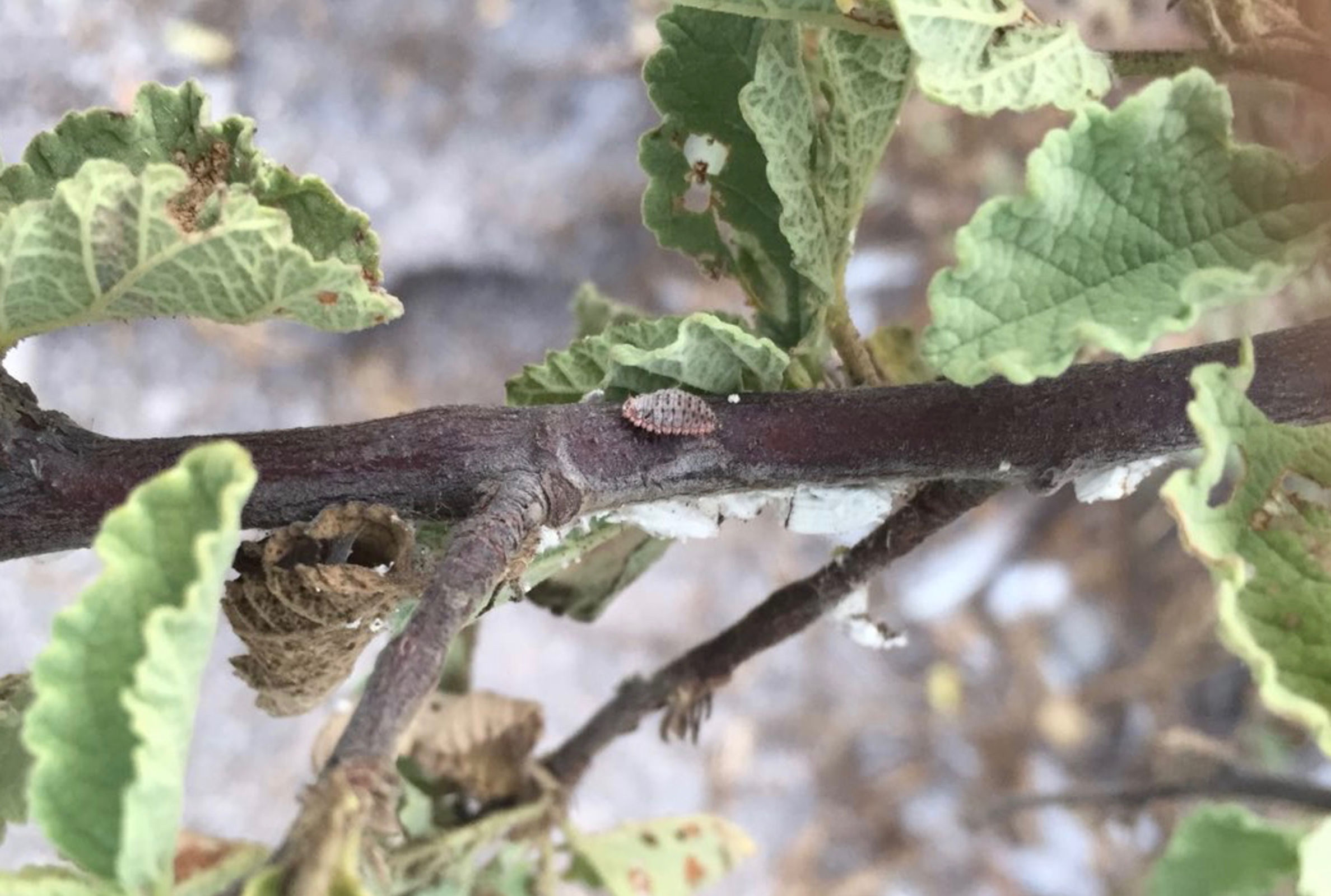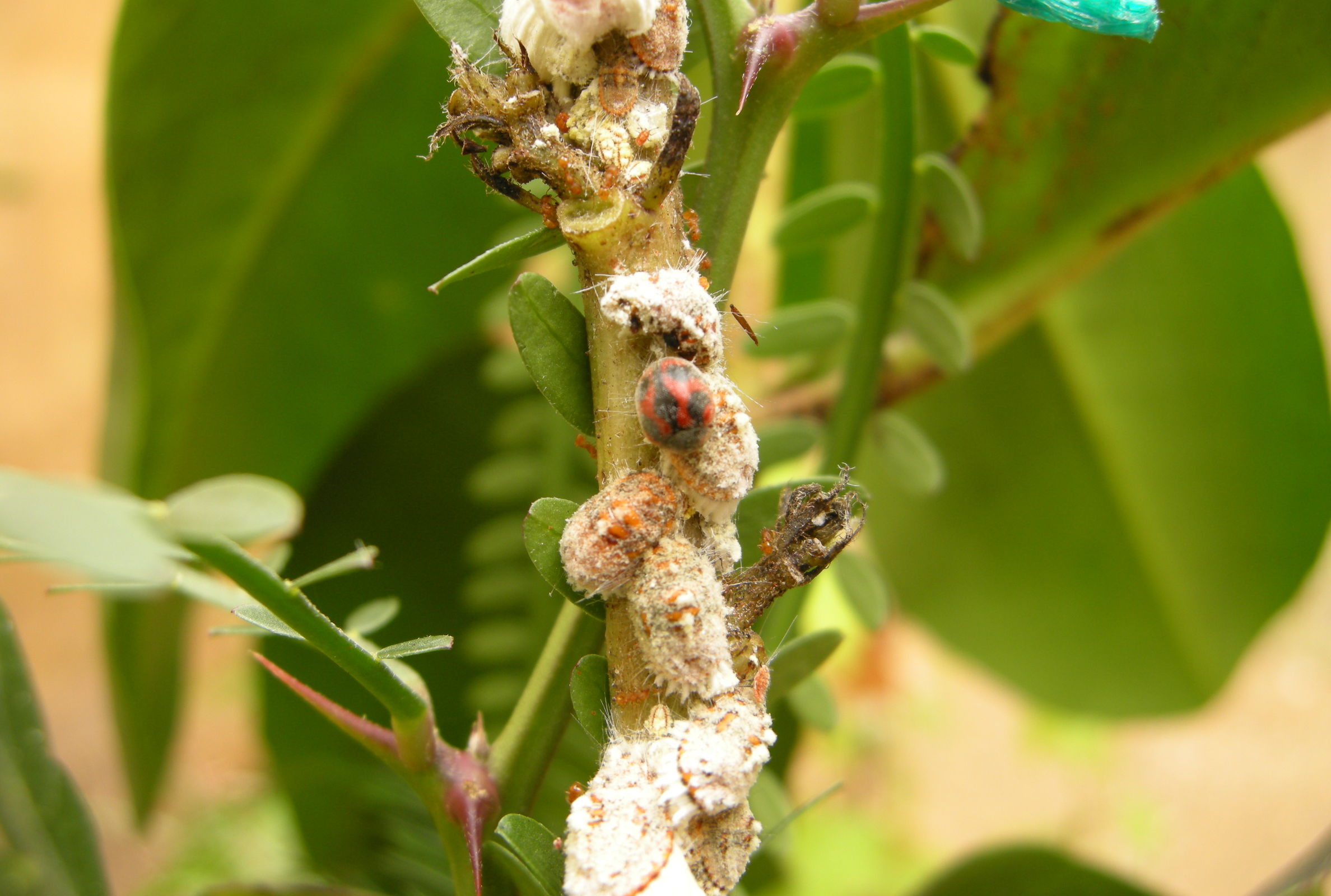Galapagos Species Database
The Galapagos Species Database shares the information about the species from our Natural History Collections.
Novius cardinalis
Mariquita, Cardinal ladybird, Vedalia beetle



The cardinal ladybird is a small, predatory, red and black beetle. Like other species of ladybeetles, the cardinal ladybird has a very round, almost spherical dorsal side while the ventral side is nearly flat. Males and females have slightly different coloration, with females more red in color and males more black in color. Elytra are covered in small gray hairs which partially obscure the red and black coloration.
Predator on Icerya purchasi, reared in quarantine at CDRS and released in 2002 to control I. purchasi.
Domain
Eukaryota
Kingdom
Animalia
Phylum
Arthropoda
Class
Insecta
Order
Coleoptera
Suborder
Polyphaga
Superfamily
Cucujoidea
Family
Coccinellidae
Section
Noviini
Genus
Novius
Species
cardinalis
Taxon category: Accepted
Syn.: Rodolia cardinalis (Mulsant, 1850); Sym.: Rodolia cardinalis (Hong P. et al., 2020).
Origin: Introduced - established
Year of first record: 2002
Year of introduction: 2002
Mode of introduction: Intentional
Introduction Pathway: Intentional
Subpathway: Biocontrol
Introduced status: Naturalized
Invasive status: Unlikely to become invasive
Map of specimen collection localities or observation records for this species in our collections database.
Distribution: Floreana, Isabela, Marchena, Pinta, Rábida, San Cristóbal, Santa Cruz, Santiago, Baltra, Fernandina, Pinzon, Genovesa, Champion. Originally from Australia.
- Causton, C.E. (2001) Dossier on Rodolia cardinalis Mulsant (Coccinellidae: Cocinellinae), a potential biological control agent for the cottony cushion scale, Icerya purchasi Maskell (Margarodidae). Charles Darwin Foundation, Galàpagos.
- Causton, C.E. Lincango, M.P. & Poulsom, T.G.A. (2004) Feeding Range Studies of Rodolia cardinalis (Mulsant), a Candidate Biological Control Agent of Icerya purchasi Maskell in the Galápagos Islands. Biological Control 29: 315-325.
- Hong Pang Xue-Fei Tang (2020) REVISION OF THE AUSTRALIAN COCCINELLIDAE (COLEOPTERA). GENUS NOVIUS MULSANT OF TRIBE NOVIINI PL ISSN 0003-4541 © Museum and Institute of Zoology PAS doi: 10.3161/00034541ANZ2020.70.1.001 ANNALES ZOOLOGICI (Warszawa), 2020, 70(1): 1-24
- Lincango, M.P. Causton, C.E., Calderón-Álvarez, C. & Jiménez-Uzcátegui, G. (2011) Evaluating the safety of Rodolia cardinalis to two species of Galapagos finch: Camarhynchus parvulus and Geospiza fuliginosa. Biological control 56: 145-149. http://dx.doi.org/10.1016/j.biocontrol.2010.10.006
- Peck, S.B. (2006) The Beetles of the Galápagos Islands, Ecuador: Evolution, Ecology, and Diversity (Insecta: Coleoptera) NRC Research Press, Ottawa, Ontario, Canada. 314 pp.
- Peñaherrera-Romero, E. Guerrero-Campoverde, A., Rueda-Rodríguez, M.P., Dávila-Játiva, M., Die-Morejón, D., Domínguez-Trujillo, M., Guerrero-Molina, T.,Vélez-Darquea, E., Cisneros-Heredia, D.F (2024) Ladybird Beetle Diversity in Natural and Human-Modified Habitats in the San Cristóbal Island, Galapagos, Ecuador. Insects, 15, 725. https://doi.org/10.3390/insects15090725
You are welcome to download and use the information found in this page, acknowledging its source.
This page should be cited as follows:
"Galapagos Species Database, Novius cardinalis", dataZone. Charles Darwin Foundation, https://datazone.darwinfoundation.org/en/checklist/?species=19226. Accessed 18 February 2026.

